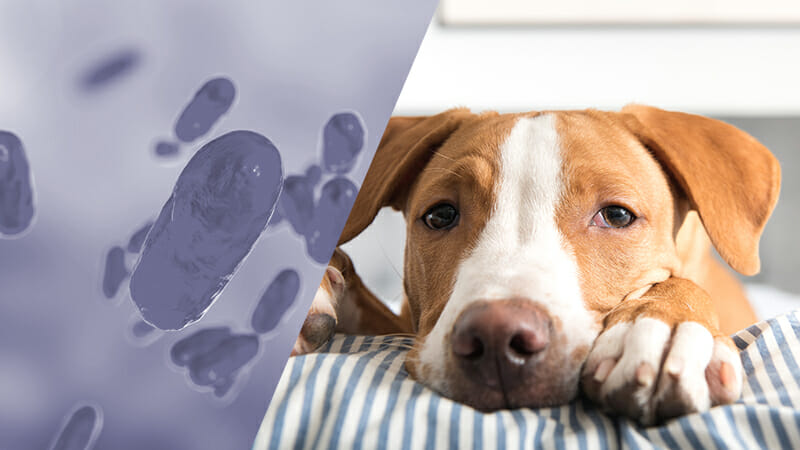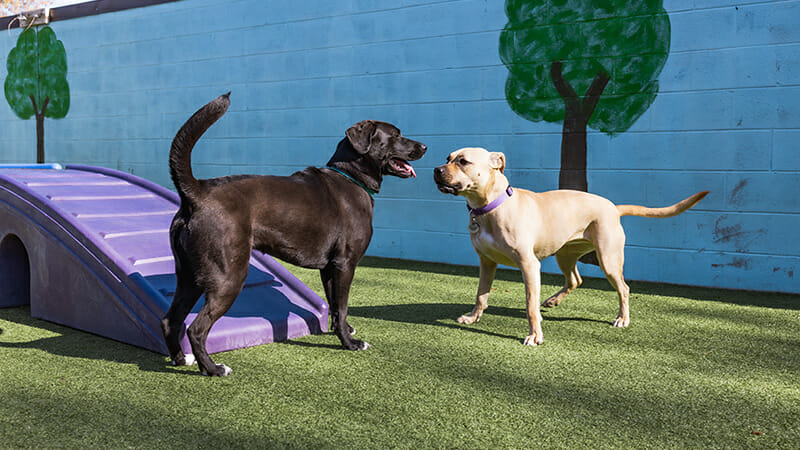We review what bordetella is and how Lucky Dog works to prevent outbreaks.
If your dog spends time in public places like doggy daycare, you may be wondering if you should feel concerned about bordetella. This common illness can spread in public places, causing concern for pet parents.
But what exactly is bordetella, and how can you protect your dog from it? In this post, we cover:
- What bordetella is
- What are the symptoms of bordetella
- How bordatella spreads
- Best practices for protecting against bordetella
We demystify this illness, how to address it, and how to prevent it, equipping you with the knowledge to protect your dog while still allowing it to enjoy a rich social life.
What Is Bordetella?
Bordetella is a canine respiratory disease similar to a cold or flu in people. It’s often referred to as “kennel cough,” which can be caused by several viruses, most commonly bordetella. (Kennel cough is also referred to as infectious canine tracheobronchitis.) Bordetella, a bacterium, infects the cells lining the respiratory tract from the trachea to the lungs, causing irritation. Additionally, it increases the likelihood of infection by viruses that often happens alongside bordetella infection.
How Does Bordetella Affect a Dog?
Common symptoms of bordetella include:
- Loud coughing or hacking, often compared to a “goose honk”
- Wheezing
- Runny nose and eyes
- Lack of energy or appetite
- Reverse sneezing
The cough could also look like gagging or retching. Some dogs may have mild symptoms but appear lethargic, depressed, or uninterested in food. Still others may be asymptomatic. Dogs can continue to show mild signs of irritation, like coughing, for several weeks after the infection has cleared.
Bordetella can last for a number of days or even weeks if it’s untreated. Even if your dog has a mild case, ignoring it can cause the condition to linger and increase the spread of the disease, putting more vulnerable dogs at risk. Plus, it may lead to additional infections in your dog.
How Does Bordetella Spread?
Bordetella spreads in several ways:
- Airborne droplets
- Direct contact with infected dogs
- Contaminated surfaces
When dogs interact, bordetella can spread through saliva or airborne particles. It can also spread through objects and surfaces like water bowls. Hands, shoes, clothing, vegetation, and sidewalks can all be contaminated with bordetella as well.
Where can bordetella spread? Anywhere that dogs interact, whether inside or outside. This includes dog parks, veterinary clinics or hospitals, daycare and boarding facilities, groomers, training classes, shelters, pet store visits, or even walks. And, of course, dogs in multi-dog households can contract it from infected members of the pack.
Bordetella can also spread from dogs to cats and vice versa. The incubation period can last from 2 to 14 days, so you might not see symptoms right away.
Common Bordetella Risk Factors
Certain conditions can put a dog at greater risk of contracting bordetella:
- Chronic heart or lung disease
- A compromised immune system
- Being unvaccinated
- Experiencing stress (as some dogs do in a kennel setting)
- Being a brachycephalic breed or a senior dog
Small puppies that haven’t yet been vaccinated are at particular risk.
Brachycephalic breeds, such as bulldogs, are at higher risk of developing pneumonia after contracting bordetella.
Fortunately, bordetella can only survive outside for about 30 minutes, but up until then, it’s extremely contagious.
Occasionally, a stronger strain can emerge that is resistant to vaccines. So, even if your dog has been vaccinated, it could still be at risk.
Can a Dog Get Bordetella Twice?
Yes, a dog can get bordetella twice, so it’s important not to get complacent after clearing it up! There are multiple strains of bordetella, and again, it mutates into new variations.
What to Do If Your Dog Has Bordetella?
Most dogs easily recover from bordetella with proper treatment. Seek veterinary care if you suspect your dog has bordetella. Unless you’re dealing with a life-threatening emergency, call the vet first to learn the protocol for bringing in a dog that may have kennel cough.
Avoid social interactions if your dog is experiencing any symptoms. Keeping your pet at home will allow them to recover while containing the outbreak.
How is Bordetella Treated?
Treatment plans vary depending on the dog’s underlying health conditions and specific symptoms. Vets often prescribe antibiotics and sometimes therapies such as humidifier treatment. Some vets may prescribe anti-inflammatories to tame the cough and facilitate recovery. Rest will also help your dog recover.
Additionally, keep your house well-ventilated and use a harness rather than a leash clipped onto a collar.
How Often to Vaccinate Your Dog for Bordetella?
Because bordetella mutates rapidly, no vaccine can prevent every strain. That being said, vaccination is a crucial precaution.
How often does your dog need the bordetella vaccine? Vets typically administer it every 6–12 months, depending on risk factors. Immunity lasts for up to a year.
Young puppies of at least six weeks old can be given nasal spray or droplets by a vet. Dogs can present with mild cold-like symptoms after this method of vaccination, but these symptoms typically resolve within a day or so. Other post-vaccination symptoms dogs can experience include lethargy and a small bump at the site of injection.
How Lucky Dog works to Control and Prevent Outbreaks
To contain an outbreak, affected dogs should be kept at home and quarantined from other dogs.
Facilities such as dog daycares and boarding kennels must work to sterilize surfaces—not just to control bordetella but also to prevent it. Cleaning should be a routine part of providing a safe and healthy environment.
At Lucky Dog Bark and Brew, we take bordetella seriously. Here are some of the main best practices we follow:
- Requiring dogs to be vaccinated
- Doing quick physical checks of incoming dogs
- Staying alert to any symptoms
- Asking people not to bring in dogs that display symptoms
- Rigorously cleaning surfaces throughout the day
- Limiting group size if a case has been detected
Keep in mind that dogs can cough for various reasons after spending time in a kennel. For instance, some develop a scratchy throat after barking a lot. Consult your vet to determine whether your dog needs treatment. If so, quick treatment can lead to faster recovery.
If you have additional questions about what measures we take to protect your dog’s health, contact us to discuss them!




